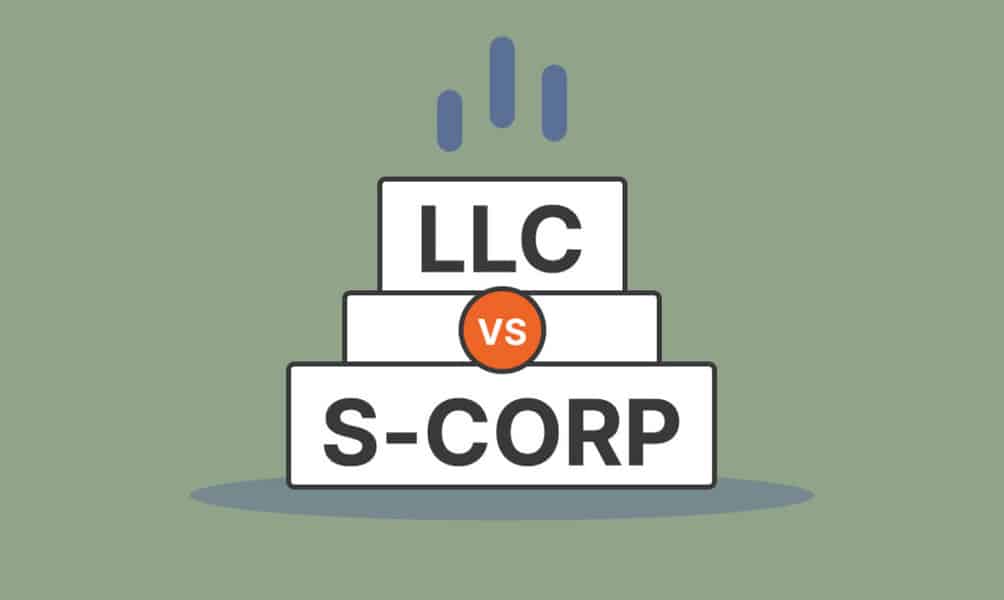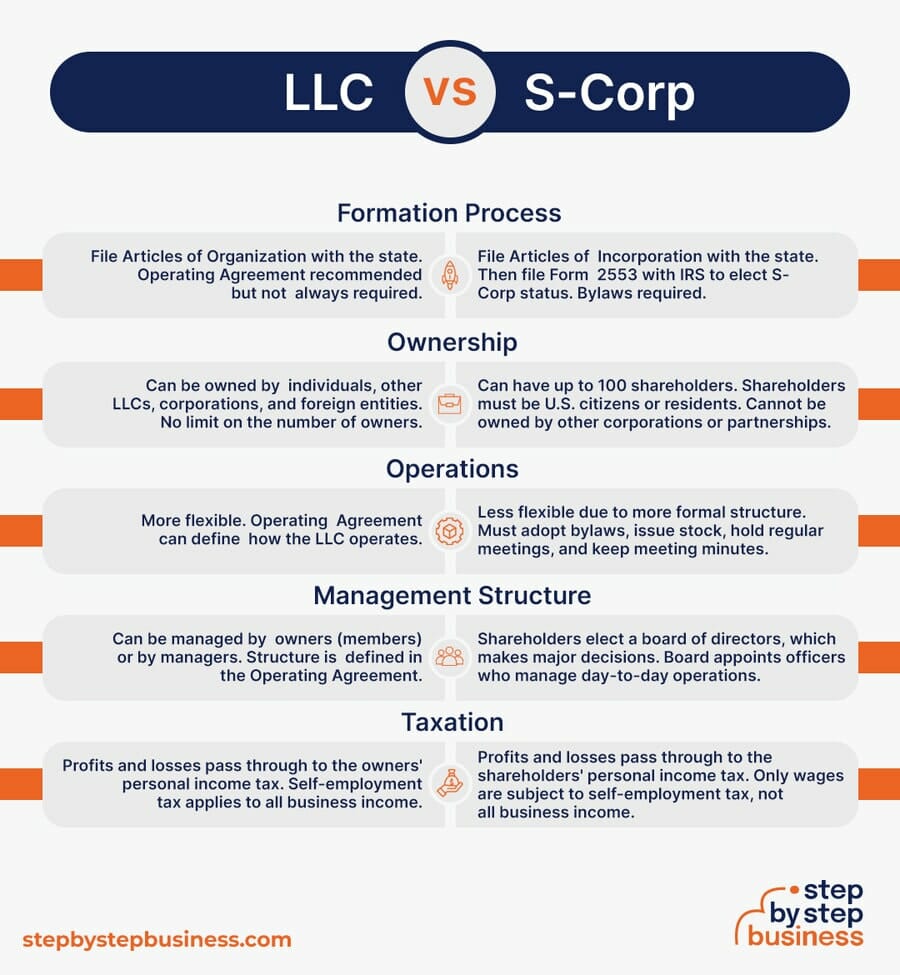If you’re starting an LLC, the business entity formation process is one of the first and most important hurdles. This step can be terribly complex ...
LLC vs. S-Corp: What are They and How They’re Different?
Written by: Carolyn Young
Carolyn Young is a business writer who focuses on entrepreneurial concepts and the business formation. She has over 25 years of experience in business roles, and has authored several entrepreneurship textbooks.
Edited by: David Lepeska
David has been writing and learning about business, finance and globalization for a quarter-century, starting with a small New York consulting firm in the 1990s.
Published on October 11, 2021

When you decide to form your own business, the type of business entity that you choose is a crucial decision. The first step is to educate yourself about the most common types of business entities chosen by small business owners. This article compares two top options – limited liability company (LLC) and S Corporation, or S-Corp.

What Is an LLC?
An LLC is an increasingly popular business structure for startups, offering liability protection for ownership and greater flexibility than a corporation, particularly in terms of taxes. The LLC itself does not pay taxes. As a “pass-through” entity, income passes through the business to the owner or owners, who report it on their personal tax returns. An LLC is created by filing paperwork with your state, and nominal fees are involved.
An LLC offers its owner or owners, who are called members, considerable flexibility in terms of management. You can choose your management and operational structure and decide how you want to be taxed.
Your LLC can have a single member or multiple members, all of whom have personal liability protection, meaning your personal assets are not at risk if you cannot pay business debts or are involved in a lawsuit.
What Is an S-Corp?
An S-Corporation refers to a business’s tax classification. It is a corporation or LLC that, by meeting certain requirements, can be taxed as an S-Corporation. As with an LLC, with an S-Corp income passes through the business to shareholders or owners, without that income being taxed as corporate income. In contrast, in a regular corporation, also known as a C-Corp, the corporation is taxed as well as the dividends shareholders receive, which is sometimes referred to as double taxation.
A corporation or LLC can be classified as an S-Corp if it has 100 or fewer shareholders or members. Shareholders pay taxes on their pass-through income at their personal income tax rates. S-Corp shareholders can only be individuals, specific trusts and estates, or certain types of tax-exempt organizations.
LLC vs. S Corporation – Differences Explained
Formation Process
To form an LLC, you need to file articles of organization with your state. These forms vary by state but can generally be filed online. You’ll need to fill out the LLC name, the name and address of the registered agent, the names of the LLC owners, and in some states, the way the LLC will be managed. Fees are generally around $100.
A registered agent is the person or company that sends and receives legal documents on behalf of your LLC. The registered agent can be a member of the LLC, or you can choose a third party such as an attorney, or a company that offers registered agent services. Most states require that you have a registered agent. The agent must be a resident of the state where you do business, or a corporation that is authorized to do business in your state.
An S-Corp must also have a registered agent in most states and must file articles of organization, which will state how many shares are being issued and how they will be issued. S-Corps also must have a board of directors, file corporate bylaws, and file form 2553, the Election by a Small Business Corporation.
Ownership
Unless it elects to be an S-Corp, an LLC can have an unlimited number of owners, and those members can be U.S. citizens, non-U.S. citizens, non-U.S. residents, or another corporate entity.
S-Corps, on the other hand, cannot have more than 100 shareholders or owners, and those shareholders cannot be non-U.S. citizens or non-residents, nor can they be another corporate entity.
Operations
In an LLC, the operations of the business are flexible and subject to few government requirements. An LLC with multiple members needs an operating agreement, which specifies each member’s ownership interest and the management structure, including each member’s role and responsibilities. It also will specify the voting rights of the members, which usually coincides with their ownership percentage.
Most states do not require an operating agreement, but it is highly recommended that you have one in place so that the ownership and management structure of the LLC are clearly stated in writing.
In an S-Corp, there are many operational requirements. The S-Corp must have a board of directors, adopt corporate bylaws, hold annual shareholder meetings, and keep minutes of important company meetings. An S-Corp can only issue one class of stock, and must be incorporated within the U.S.
Management Structure
In an LLC, the members can decide if the business will be member-managed or non-member managed, meaning that non-owners of the business will play management roles.
S Corps must have a board of directors as well as corporate officers. The board of directors oversees the management and is in charge of major decisions for the corporation. The corporate officers, such as the CEO and Chief Financial Officer (CF), manage the company’s day to day business operations.
S-Corps also generally exist perpetually, while an LLC, if a member leaves, may be dissolved.
Taxation
An LLC with only one member is taxed as a sole proprietorship. The income of the business is passed through to the single member to be taxed at the member’s personal income tax rate. A multi-member LLC is taxed as a partnership. Each member’s share of the income is passed through to them to be taxed at their personal income tax rate. LLC owners also may be eligible for the 20% pass-through deduction that was part of the Tax Cuts and Jobs Act, meaning that they can deduct up to 20% of the business income.
A multi-member LLC must also file form 1065 with the IRS, which is the Return of Partnership Income. Attached to this will be form K-1s for each member showing their share of the business income. Members are also responsible for paying self-employment taxes.
S-Corps can choose to pass income through to their shareholders for federal tax purposes, and shareholders then report the income on their personal tax returns and pay taxes at their personal tax rate, thus avoiding the double taxation of corporations.
S-Corps use Form 1120S to file their taxes, which is used to report the income, losses, and dividends of shareholders. S-Corp shareholders do not pay self-employment taxes, which is one of the biggest benefits of having S-Corp status.
Which Is Right for You – LLC or S-Corp?
Generally, S-Corp tax status is beneficial if the company is profitable enough to pay the owners a salary and at least $10,000 in annual distributions so the owners can be taxed as employees and not pay self-employment taxes.
It’s more expensive to run an S-Corp than an LLC due to additional bookkeeping and payroll expenses. The tax benefits must be more than the additional costs for S-Corp status to make financial sense.
Other than that, LLCs and an S-Corps are very similar in terms of pass-through income taxation and personal liability protection. If you plan to raise a significant amount of outside capital and grow to eventually go public, you should choose S-Corp status.
If you are a small company with few members and desire more management flexibility, an LLC may be the best choice for you. It’s a good idea to consult with a tax attorney before making this very important decision for your business.
Can an LLC own an S-Corp?
Under the IRS rules, S-Corp shareholders:
- May be individuals, certain trusts, and estates and
- May not be partnerships, corporations, or non-resident alien shareholders
If an LLC has more than one member, it is taxed as a partnership unless it elects to be taxed as a corporation. This means that under IRS rules, the LLC is considered a partnership or a corporation and therefore cannot be an S-Corp shareholder. So, in this case, the answer to the question is no, an LLC cannot own an S-Corp.
But if an LLC has only one member and has not elected to be taxed as a corporation, it is taxed as a sole proprietorship and therefore is considered a disregarded entity by the IRS. This means that the LLC files no federal tax form. Profits are passed through to the sole member, who reports the LLC income on their personal tax return.
In this case, the LLC can own an S-Corp under IRS rules. So, a single-member LLC that has not elected to be taxed as a corporation can own an S-Corp.
Why Does the IRS Have This Rule?
Since an S-Corp has pass-through taxation, if an LLC owns a share of the S-Corp, S-Corp profits will pass through to the LLC. If the LLC has an owner that is not required to file U.S. taxes, that income would not be subject to taxation at all. This mea
Subscribe to Our Newsletter
and gain insider access to cutting-edge business insights and trends.
Featured Resources

10 Best LLC Formation Services
Published on August 22, 2022
Read Now

How an LLC Protects You Personal Assets and When it Doesn’t
Published on January 6, 2022
A limited liability company (LLC) is one of the most popular business entity types for startup companies in part because of the liability protection ...
Read Now

5 Best States to Form an LLC
Published on December 22, 2021
If you’re starting a new company and have decided to form a limited liability company (LLC), you may have heard that some states have advantageswh ...
Read Now
Comments